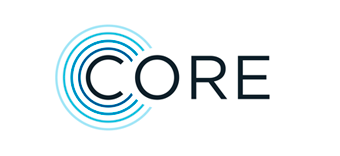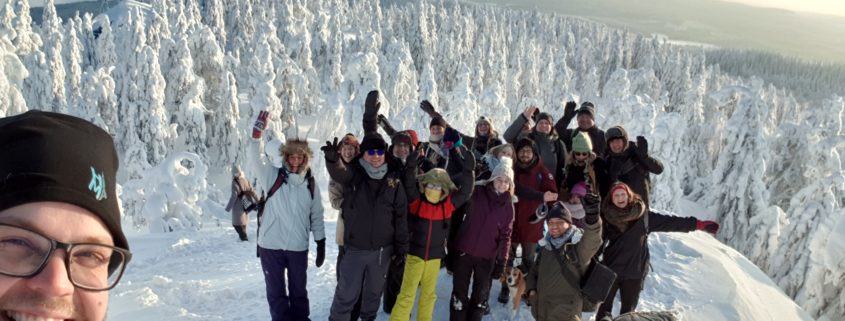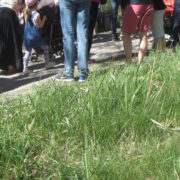Science, activism and societal impact – diversity of relationships
Activism is often perceived as open acts for promoting changes in society. It may take the form of campaigning, demonstrating or advocating for legislative changes for example in animal rights or nature conservation or protesting against enterprises or projects, or proactively organising peer-to-peer services, crowdfunding projects or alternative plans. It may also be about empowering vulnerable groups, such as indigenous peoples or marginalised communities.
When activism is understood as described above – open acts – the relationship between science and activism is rather straightforward: Some scientists are activists. This may be true even if they are not called such or if they do not identify themselves as an activist. The arenas of activism may or may not be intertwined with the research they do.
The demand of having societal impacts by research is getting ever stronger. Ways to have an impact are various, however. Researchers are sometimes involved in creating practical solutions to societal or environmental problems but more often they seek discursive ways of introducing change or having an impact in societal transitions. This includes information and knowledge production, creating arenas for discussion or revealing inequalities.
Expert knowledge is not a “neutral” way to see the world, and research has never been detached from social and political life. There are many choices that affect researchers’ potential for having societal impact, e.g. the choices made in formulating research questions, choosing research methods and arenas for publishing the results.
Researcher-activist faces pros and cons
Being called an activist is not always something the researcher may like or strive for. It may be a negative label which can also be used in attempts to downgrade the expertise of a researcher in conflicting situations. Activism is situated, socially constructed, and not about the message a researcher delivers. It is about the relation between the messenger and the audience.
As an invited speaker in a parliamentary committee a researcher is usually regarded as an expert, but if she enters the arena uninvited she may be labelled as an activist.
Being heavily involved in activism on the field one is doing research, for example, as a community member, has pros and cons. Involvement guarantees, or at least eases, the access to internal information. A researcher as activist can also be a great resource for individuals and communities and essential for empowerment. Moreover, in particular cases, some groups are interested to attract and engage with science and work with allied researchers.
However, for an activist researcher it might be more challenging to maintain objectivity compared to researches with more distant engagement (i.e participatory observations). It might also be that the presence and involvement of an activist researcher might work against the communities. Communities might be heavily criticized for involving an activist or the published research results of an activist researcher might be used against the interests of the community by external parties. Security risks for the community members can be greater, if an activist researcher is involved.
Do no harm!
One important principle in combining science and activism especially when working with vulnerable groups and small communities is a Do no harm -principle. The risks and potentials should be discussed transparently with parties involved and people involved should have a real possibility to use veto rights, if something that the researcher is planning to do, is likely to risk the life, health, ownership or social relations in the community.
In particular with the vulnerable groups it should be ensured that there are no harmful stereotypes or stigmas that the researcher creates or maintains.
Science and activism have to do with power. Activists often fight existing power relations — or are deemed to do so. Activism differs from those attempts to change the society that leave asymmetrical social relations intact, for example, research promoting transitions that strengthen the interest of powerful elites or businesses. Power can be reshaped or renegotiated, with unpredictable and often contradictory outcomes. Power is not legitimated only by hegemonic expert knowledge represented by for example state institutions, corporate interests, or law, because its legitimacy is co-created by communities confronting institutions representing power.
Science is also a powerful tool – how do we use it? To maintain power relations and status quo or to empower transformation? Is passivism a form of activism if it has societal impact? Inaction can maintain status quo and dominant power relations and thus support some views about society and how its problems should be resolved and by whom. Inaction can also actively prevent transformation.
Activism against and for science
The role of science or scientists can take many, also more subtle forms in its relations to activism. While the word activist carries a risk of being questioned as an expert or labelled otherwise negatively, other, more subtle types of active engagement in the society are not identified as activism. If activism is understood more broadly, for example as ‘attendance in or contribution to societal transitions’, the relationship between science and activism becomes more difficult to detect. Although not called as activism, same kind of questions about objectivity or the impact of academic work on communities apply to these forms of academic activism.
Activism against science has posed these questions openly. Examples include the long-tradition of protesting against risky technologies that science helps to develop or advocating against the use of animal experimentations in scientific research. These disputes can take place inside or outside the academia, and they question the hegemony of particular kinds of sciences and scientists determining societal development and practices.
The goals promoted by academic activists, such as climate change policies or ban on neonicotinoids, can also be opposed by powerful lobby groups. They too target the power of science and expertise to formulate societal goals, albeit from a different angle, resisting attempts to change the hegemony of economic interests. On the other hand, there is science activism aiming to improve science itself. Open science activism, for example, aims at giving access to knowledge and expertise to wider groups in the society.
Academics need to reflect on the impacts of their work
The relationship between science and activism can also take the form of scientists helping activists. Scientists can collaborate with activists in various ways: organizing seminars, workshops, help with writing statements, complaints or other reporting, offering microsupport, e.g. tweeting and using other social media. Researchers can also help to reach international visibility, for example to help activists build networks or get support. Researchers can help make activism research-based and activists can utilize scientific practices in their activism. For example, many community science projects aim at evidence-based activism and social transformations to fight environmental impacts.
These questions challenge the understanding of activism and raise discussion about its role in the society. While societies are facing need to respond to global challenges it may not be enough to contribute scientifically to technocratic, top-down driven transition processes where changes take place within existing societal structures and frames. Also more diverse and emergent transformation processes challenging incumbent structures are needed. Academics might have a role in promoting such bottom-up transformation. However, it is also ok to refuse to be an activist. Regardless of the type of societal engagement, academics need to be more open about and ready to reflect on their societal role and the impact of their work on the society.
Outi Ratamäki, Maija Faehnle, Heta Heiskanen, Taru Peltola & Germán A. Quimbayo Ruiz
Photo: Ville Tahvanainen
This blog is based on the discussions during Science and Activism seminar held at the University of Eastern Finland (UEF) in January 2019. The seminar was organized by UEF’s LYY Institute and two Strategical Research Council funded research projects CORE and ALL-YOUTH.
Outi Ratamäki works as a senior lecturer at the Law School, University of Eastern Finland. She studies natural resources governance at the crossroads of law and policy.
Maija Faehnle is a senior researcher at the Finnish Environment Institute SYKE. She is the communication manager of the CORE project and studies aspects of activism, civil society and collaboration especially in urban contexts.
Heta Heiskanen is a Post-Doc in ALL-YOUTH -project funded by the Strategic Research Council. She has specialized in human rights law and the environment. She has been actively cooperating with NGOs. Currently she is a board member of the Finnish Association for Nature Conservation.
Taru Peltola works as a Senior Research Scientist at the Finnish Environment Institute SYKE and leads the CORE-project’s case study work package.
Germán A. Quimbayo Ruiz is an Ecologist and Geography MSc. Researcher and Ph.D. student in Environmental Policy, Department of Geographical and Historical Studies, University of Eastern Finland, Joensuu. External researcher, Natural Resources Institute Finland, LUKE (Turku). I have worked with environmental state-agencies and social organizations in Colombia.






Leave a Reply
Want to join the discussion?Feel free to contribute!